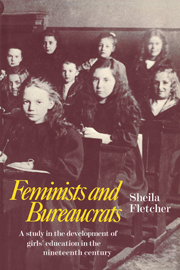Book contents
- Frontmatter
- Contents
- Preface
- Introduction: The Endowed Schools Act
- 1 The shaping of Section 12
- 2 The men who rejected the dead hand
- 3 The money problem
- 4 Opponents
- 5 Supporters
- 6 What was achieved
- 7 The changeover of 1874
- 8 The long haul
- 9 The Charity Commission spirit
- 10 The women's movement in the later years
- Appendices
- Notes
- Select Bibliography
- Index
2 - The men who rejected the dead hand
Published online by Cambridge University Press: 07 October 2011
- Frontmatter
- Contents
- Preface
- Introduction: The Endowed Schools Act
- 1 The shaping of Section 12
- 2 The men who rejected the dead hand
- 3 The money problem
- 4 Opponents
- 5 Supporters
- 6 What was achieved
- 7 The changeover of 1874
- 8 The long haul
- 9 The Charity Commission spirit
- 10 The women's movement in the later years
- Appendices
- Notes
- Select Bibliography
- Index
Summary
‘Here is money for the relief of Barbary captives’, says the court, ‘but there are no Barbary captives. Then let us see how near we can go to a Barbary captive.’
J. G. Fitch, 1869The Commissioners are appointed
No particular interest was shown in the Commons when it was announced in June 1869 that the three Commissioners appointed to administer the Endowed Schools Act would be Lord Lyttelton, Arthur Hobhouse and Canon Hugh Robinson. No one voiced alarm, though Lyttelton had spoken in draconian terms at the Social Science Congress the previous year on the need to reanimate school endowments, at present ‘lying crushed under … a mass of stupidity, ignorance and maladministration’. He had referred, of course, to the Taunton Report and everything he said about incompetent trustees, or taking power to transfer endowments from one part of the country to another or, above all, of the need to depart from slavish deference to founders' wishes, could be found there. But he left no doubt of his own entire adherence to these views, borrowing the phrase of Arthur Hobhouse, the Charity Commissioner and law reformer: ‘Property is not the property of the dead but of the living.’
Nine months later, he found himself appointed as chief of the Endowed Schools Commissioners who were to reform the grammar schools. He had not changed his earlier opinions. On the contrary, he held them so strongly that he felt obliged to make a clean breast of them lest he seem to act under false pretences.
- Type
- Chapter
- Information
- Feminists and BureaucratsA Study in the Development of Girls' Education in the Nineteenth Century, pp. 30 - 52Publisher: Cambridge University PressPrint publication year: 1980



